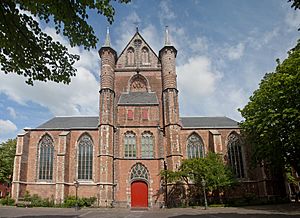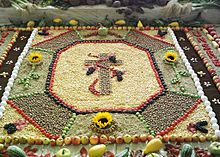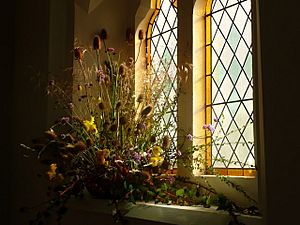Thanksgiving facts for kids
Quick facts for kids Thanksgiving Day |
|
|---|---|
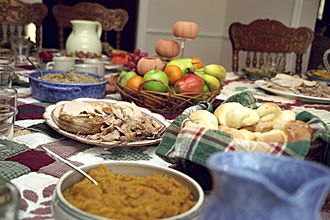
A traditional American Thanksgiving dinner
|
|
| Observed by | States
Territories Other |
| Type | National, cultural |
| Date | 2nd Monday in October (Canada) 1st Thursday in November (Liberia) Last Wednesday in November (Norfolk Island) Fourth Thursday in November (U.S., Puerto Rico) |
| 2024 date | October 14, 2024 (Canada); November 7, 2024 (Liberia); |
Thanksgiving Day is a national holiday celebrated in Canada, the United States, some of the Caribbean islands, and Liberia. It began as a day of giving thanks for the blessing of the harvest and of the preceding year. Similarly named festival holidays occur in Germany and Japan. Thanksgiving is celebrated on the second Monday of October in Canada and on the fourth Thursday of November in the United States, and around the same part of the year in other places. Although Thanksgiving has historical roots in religious and cultural traditions, it has long been celebrated as a secular holiday as well.
Contents
History
Prayers of thanks and special thanksgiving ceremonies are common among almost all religions after harvests and at other times. The Thanksgiving holiday's history in North America is rooted in English traditions dating from the Protestant Reformation. It also has aspects of a harvest festival, even though the harvest in New England occurs well before the late-November date on which the modern Thanksgiving holiday is celebrated.
In the English tradition, days of thanksgiving and special thanksgiving religious services became important during the English Reformation in the reign of Henry VIII and in reaction to the large number of religious holidays on the Catholic calendar. Before 1536 there were 95 Church holidays, plus 52 Sundays, when people were required to attend church and forego work and sometimes pay for expensive celebrations. The 1536 reforms reduced the number of Church holidays to 27, but some Puritans wished to completely eliminate all Church holidays, including Christmas and Easter. The holidays were to be replaced by specially called Days of Fasting or Days of Thanksgiving, in response to events that the Puritans viewed as acts of special providence. Unexpected disasters or threats of judgement from on high called for Days of Fasting. Special blessings, viewed as coming from God, called for Days of Thanksgiving. For example, Days of Fasting were called on account of drought in 1611, floods in 1613, and plagues in 1604 and 1622. Days of Thanksgiving were called following the victory over the Spanish Armada in 1588 and following the deliverance of Queen Anne in 1705. An unusual annual Day of Thanksgiving began in 1606 following the failure of the Gunpowder Plot in 1605 and developed into Guy Fawkes Day on November 5.
In Canada
According to some historians, the first celebration of Thanksgiving in North America occurred during the 1578 voyage of Martin Frobisher from England in search of the Northwest Passage. Other researchers, however, state that "there is no compelling narrative of the origins of the Canadian Thanksgiving day."
The origins of Canadian Thanksgiving are also sometimes traced to the French settlers who came to New France in the 17th century, who celebrated their successful harvests. The French settlers in the area typically had feasts at the end of the harvest season and continued throughout the winter season, even sharing food with the indigenous peoples of the area.
As settlers arrived in Nova Scotia from New England after 1700, late autumn Thanksgiving celebrations became commonplace. New immigrants into the country—such as the Irish, Scottish, and Germans—also added their own traditions to the harvest celebrations. Most of the US aspects of Thanksgiving (such as the turkey) were incorporated when United Empire Loyalists began to flee from the United States during the American Revolution and settled in Canada.
In the United States
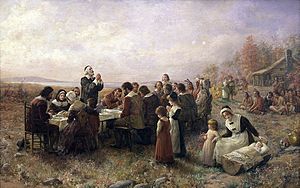
In the United States, the modern Thanksgiving holiday tradition is traced to a sparsely documented 1621 celebration at Plymouth in present-day Massachusetts, and also to a well recorded 1619 event in Virginia. The 1621 Plymouth feast and thanksgiving was prompted by a good harvest. Pilgrims and Puritans who began emigrating from England in the 1620s and 1630s carried the tradition of Days of Fasting and Days of Thanksgiving with them to New England. The 1619 arrival of 38 English settlers at Berkeley Hundred in Charles City County, Virginia, concluded with a religious celebration as dictated by the group's charter from the London Company, which specifically required "that the day of our ships arrival at the place assigned ... in the land of Virginia shall be yearly and perpetually kept holy as a day of thanksgiving to Almighty God."
Several days of Thanksgiving were held in early New England history that have been identified as the "First Thanksgiving", including Pilgrim holidays in Plymouth in 1621 and 1623, and a Puritan holiday in Boston in 1631. According to historian Jeremy Bangs, director of the Leiden American Pilgrim Museum, the Pilgrims may have been influenced by watching the annual services of Thanksgiving for the relief of the siege of Leiden in 1574, while they were staying in Leiden. Now called Oktober Feesten, Leiden's autumn thanksgiving celebration in 1617 was the occasion for sectarian disturbance that appears to have accelerated the pilgrims' plans to emigrate to America. Later in Massachusetts, religious thanksgiving services were declared by civil leaders such as Governor Bradford, who planned the colony's thanksgiving celebration and fast in 1623. The practice of holding an annual harvest festival did not become a regular affair in New England until the late 1660s.
Thanksgiving proclamations were made mostly by church leaders in New England up until 1682, and then by both state and church leaders until after the American Revolution. During the revolutionary period, political influences affected the issuance of Thanksgiving proclamations. Various proclamations were made by royal governors, John Hancock, General George Washington, and the Continental Congress, each giving thanks to God for events favorable to their causes. As President of the United States, George Washington proclaimed the first nationwide Thanksgiving celebration in America marking November 26, 1789, "as a day of public thanksgiving and prayer to be observed by acknowledging with grateful hearts the many and signal favours of Almighty God."
Observance
Australia
Thanksgiving is generally not celebrated in Australia. However, on the Australian external territory of Norfolk Island, Thanksgiving is celebrated on the last Wednesday of November, similar to the pre–World War II American observance on the last Thursday of the month. This means the Norfolk Island observance is the day before or six days after the United States' observance. The holiday was brought to the island by visiting American whaling ships.
Canada
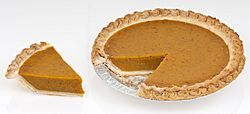
Thanksgiving (French: l'Action de grâce), occurring on the second Monday in October, is an annual Canadian holiday to give thanks at the close of the harvest season. Although the original act of Parliament references God and the holiday is celebrated in churches, the holiday is mostly celebrated in a secular manner. Thanksgiving is a statutory holiday in all provinces in Canada, except for New Brunswick and Nova Scotia. While businesses may remain open in these provinces, the holiday is nonetheless recognized and celebrated regardless of its status.
Grenada
In the West Indian island of Grenada, in the Caribbean, there is a national holiday known as Thanksgiving Day which is celebrated on October 25. Even though it bears the same name, and is celebrated at roughly the same time as the American and Canadian versions of Thanksgiving, this holiday is unrelated to either of those celebrations. Instead the holiday marks the anniversary of the U.S.-led invasion of the island in 1983, in response to the deposition and execution of the socialist Grenadian Prime Minister Maurice Bishop.
Liberia
In the West African country of Liberia, which began in 1820 with the colonization of freed black slaves (Americo-Liberians) from the United States, Thanksgiving is celebrated on the first Thursday of November.
The Netherlands
Many of the Pilgrims who migrated to the Plymouth Plantation had resided in the city of Leiden from 1609–1620, and had recorded their births, marriages, and deaths at the Pieterskerk (St. Peter's church). To commemorate this, a non-denominational Thanksgiving Day service is held each year on the morning of the American Thanksgiving Day in the Pieterskerk, a Gothic church in Leiden, noting the hospitality the Pilgrims received in Leiden on their way to the New World.
Besides this, Thanksgiving is observed by orthodox Protestant churches in The Netherlands on the first Wednesday in November (Dankdag). It is not a public holiday. Those who observe the day either only go to church in the evening or take the day off and go to church in the morning (and occasionally afternoon) too.
Philippines
The Philippines, while it was an American colony in the first half of the 20th century, celebrated Thanksgiving as a special public holiday on the same day as the Americans. During the Japanese occupation during World War II, both the Americans and Filipinos celebrated Thanksgiving in secret. After Japanese withdrawal in 1945, the tradition continued until 1965. It was revived by President Ferdinand Marcos, but on every September 21, when martial law was imposed in the country. After Marcos' ouster in 1986, the tradition was no longer continued. Due to the existence of BPO - Business Process Outsourcing since 2001 this tradition continues for the local workers joining their American employers.
Saint Lucia
The nation of Saint Lucia celebrates Thanksgiving on the first Monday in October.
United States
Thanksgiving, currently celebrated on the fourth Thursday in November by federal legislation in 1941, has been an annual tradition in the United States by presidential proclamation since 1863 and by state legislation since the Founding Fathers of the United States. Historically, Thanksgiving has traditionally been a celebration of the blessings of the year, including the harvest. What Americans call the "Holiday Season" generally begins with Thanksgiving.
Judaism
In Reform Judaism, there is no hindrance to celebrating Thanksgiving, since it is regarded as a secular celebration rather than religious or gentile. In Orthodox Jewry as well, many Rabbis permit or even encourage Thanksgiving celebration.
Similar holidays
Germany
The Harvest Thanksgiving Festival, Erntedankfest, is a popular German Christian festival in early October. The festival has a significant religious component, and unlike its North American counterpart, it usually does not include large dinners. Many churches get decorated with autumn crops, beautifully arranged in front of the altar. In some places, there are religious processions or parades. Many Bavarian beer festivals, like the Munich Oktoberfest, take place within the vicinity of Erntedankfest.
The United States has observed German-American Day annually on October 6, within the vicinity of Erntedankfest, from 1883 until the early 1910s, then again from 1983 to the present day.
Japan
Labor Thanksgiving Day (勤労感謝の日, Kinrō Kansha no Hi) is a national holiday in Japan. It takes place annually on November 23. The law establishing the holiday, which was adopted during the American occupation after World War II, cites it as an occasion for commemorating labor and production and giving one another thanks. It has roots in an ancient Shinto harvest ceremony (Niiname-sai (新嘗祭)).
United Kingdom
The Harvest Festival of Thanksgiving does not have an official date in the United Kingdom, however it is traditionally held on or near the Sunday of the harvest moon that occurs closest to the autumnal equinox. Harvest Thanksgiving in Britain also has pre-Christian roots when the Saxons would offer the first sheaf of barley, oats, or wheat to fertility gods. When the harvest was finally collected, communities would come together for a harvest supper. When Christianity arrived in Britain many traditions remained, and today Harvest Thanksgiving is marked by churches and schools in late September/early October (same as Canada) with singing, praying and decorating with baskets of food and fruit to celebrate a successful harvest and to give thanks. Collections of food are usually held which are then given to local charities which help the homeless and those in need.
Related pages
See also
 In Spanish: Día de Acción de Gracias para niños
In Spanish: Día de Acción de Gracias para niños


